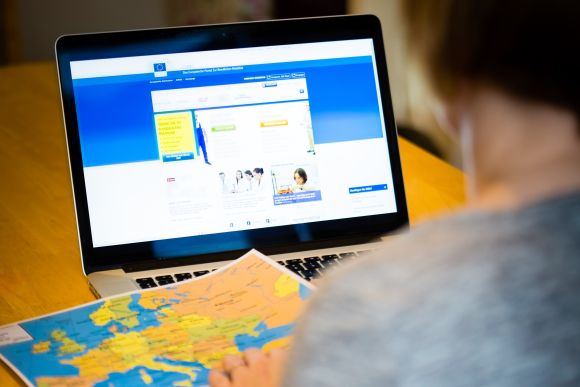
EURES (EURopean Employment Services) is a European cooperation network that provides jobseekers in Europe with employment opportunities. Would there be equal working conditions for all Europeans in the future? This and more questions were raised at the info session "How young people can enter the labor market with the help of EURES network cooperation" held on October 13, 2022 as part of the European Week of Regions and Cities.
"I believe my story proves that when you have a clear goal in your mind, no one can stop you," is the statement of a nurse from Trier, Germany. The quote is written on a slide during the info session about EURES network cooperation – the young nurse has been able to use the network beneficially for her own career.
Promotion of professional mobility
The European cooperation network EURES has been in existence since 1994. It involves the European Commission and the European Employment Services (ELA), as well as national public and other recognized employment services in all EU countries, Liechtenstein, Iceland, Norway and Switzerland. EURES is funded by the European Commission through its Employment and Social Innovation Programme (EaSi). The aim of the programme is to support the free movement of workers at the EU level by bringing together applicants and vacancies, i.e. promoting job mobility in Europe. The programme's focus is to provide a level playing field in the labor market to all European citizens, regardless of cultural differences or language barriers. According to the EURES portal itself, nearly four million vacancies are currently being offered through the program.
Balasz Lengyel explains how the network works
Over 50 people gathered in the Zoom room on Thursday morning to learn more about EURopean Employment Services. First to speak is Balasz Lengyel, a consultant in the field of EU law and policy working for EURES. Lengyel gives the guests in the Zoom room a first insight into what the EURopean Employment Services coorperation network includes and how it works. Many have already heard of the network, but some are completely unfamiliar with the term – his introduction is helpful to bring all listeners to the same level.
Support programs in Italy
After the general introduction follows Germana Monaldi, a project manager, responsible for targeted support programs in Italy. She enthusiastically reports on her own experience with the coorperation network, a key experience in her own life: " It was a great opportunity not only to work, but also to travel and get a taste of European air." It is rare to have all these opportunities, Monaldi highlights.
EURES in cross-border vocational training
In the last part of the event speaks René Meier from the Federal Employment Agency in Germany. He explains how the EURES network is used in cross-border vocational training in the Upper Rhine Valley region on the German-French border. "This program is a key to cross-border cooperation," says Meier. "It's a great opportunity for young people because the program promotes learning on the job.".
The ideal of equal working conditions in Europe
Even though the event gave the impression of a promotional event and it would have been exciting to hear more testimonials from participants, the audience was able to get a good understanding of what the EURES network represents. It would also have been beneficial to address weaknesses of the program, e.g. some testimonials reported that the processing time of submitted personnel forms can be very long.
Nevertheless, the info session did what is promised in the description of the event: giving an insight into the EURES program. It is a network which, despite some weaknesses, offers a unique opportunity to get at least a step closer to the ideal of providing equal working conditions to all Europeans.
Clara Hoheisel | Edited by Vicky Hristova



